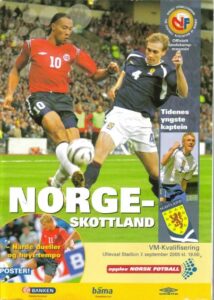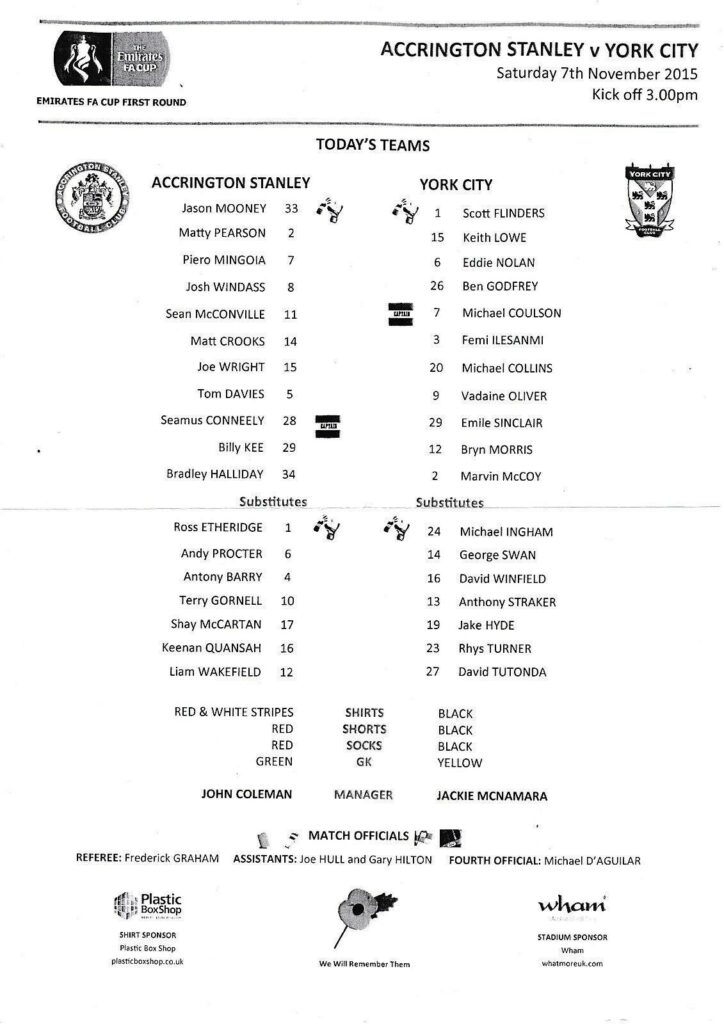Book Review – Scotland 42 England 1: An Englishman’s Mazy Dribble Through Scottish Football by Mark Winter
 I once went to see a show at the Edinburgh Festival Fringe – where else would you get this quality of entertainment, nobody ever asked ever – where a guy told us the tale of how he got his Guinness World Record back – for managing to visit all of the London Underground stations in the shortest time. He spared us many of the gory details, but I was reminded obliquely of this when I started reading Scotland 42, England 1 by Mark Winter. Doing the 42, is a test which many have undertaken that means you must visit all 42 grounds in the Scottish Professional Football League. Having read this, it requires less gory detail and much patience – and some degree of financial investment. That would be true if you were living in Scotland when attempting it but Mark lives and works in Dover! No wonder it took him eight years – though he did manage to fit a wee pandemic in, in the middle of it. So fair play.
I once went to see a show at the Edinburgh Festival Fringe – where else would you get this quality of entertainment, nobody ever asked ever – where a guy told us the tale of how he got his Guinness World Record back – for managing to visit all of the London Underground stations in the shortest time. He spared us many of the gory details, but I was reminded obliquely of this when I started reading Scotland 42, England 1 by Mark Winter. Doing the 42, is a test which many have undertaken that means you must visit all 42 grounds in the Scottish Professional Football League. Having read this, it requires less gory detail and much patience – and some degree of financial investment. That would be true if you were living in Scotland when attempting it but Mark lives and works in Dover! No wonder it took him eight years – though he did manage to fit a wee pandemic in, in the middle of it. So fair play.
But this was never about setting any kind of record. This was never about trying to write a travelogue which would illuminate and demonstrate the beauty of 11 v 11, the tactics employed between the UEFA finalists and the playoff hopefuls. This was about something else. Sheer joy. Of the game. Of the pursuit of it. And of the people around it.
And here it is an absolute winner.
I will admit when I first got this, I delved into when Mark visited my team, my home ground to find out what I was doing at the time – in the MacDonald’s in Whitletts Road, Ayr, with my youngest daughter, an ardent Rangers fan, whilst my team was being humped by them 6-1! I was also interested to see if we had shared the same grounds on the same day when I had been at the same games reporting for Kicktalk – the Accies and the Morton games, I think. Once satisfied with trivia, I delved into this to spot some more and feel the depth of love Mark has for the subject matter. The whole book is just one long volume of pleasure from one chapter to the next.
Mark’s style of his writing, self-deprecating and never taking himself too seriously which, chimes with ordinary football fans – those who do not turn up at grounds with mortgage level fees for season tickets and where the corporate are treasured more than the individuals who pass a scarf from one generation to another.
So, a guy who supports “the other” DAFC – Dover Athletic – decides to visit all the grounds in Scotland whilst working to make ends meet. The project brings him into contact with many a “character” – from the guy who shows him the greatest view in football, in the centre circle of Dumbarton FC’s ground, to the officious official who would not take cash to let him see a Colts team, to a groundsman in Cliftonhill who advised of much and many. There are also the fans who, like Mark, are there for their love of a game that is both a cruel mistress and a proper harlot.
And so, aside from the people who he met, and the grounds he tried and eventually got to see – Stirling Albion – this reads like more than a travelogue. The games are described but once you realise that the affection for the game comes from the event itself, you get to understand what having visits to Elgin and Stranraer mean and why Cove Bay disappoints as it has nothing of the expected exotic about it.
Mark is able to contextualise the place each ground has in each of the towns, and why that matters. We get much detail of the quality of the fare for eating and drinking which make a difference. There are descriptions of the hostels stayed in, the B&Bs enjoyed as our man who worked in a school manages to get to 42 grounds in 57 chapters – whatever he was working in a school for, it may not have been for maths – and we marvel not just at the dedication, but the number of times someone he knows from Dover turns up at grounds in the middle of Scotland he has visited – has Dover nothing to keep them back? Though it must be said that the story of Tom Donnelly (exported to Dover from Cowdenbeath) is worthy of further investigation.
There are many highlights, notwithstanding how to deal with Jehovah’s Witnesses in Elgin, the closest thing to a vegetarian option in a Falkirk chippy being a white pudding, a pointless answer around a railway station in Coatbridge, the pathos of being, in Pathos (apologies) when finding out that Hibs had been relegated, the affection for them and Hearts, in a city where he loved spending time whilst witnessing the cut and thrust of Scottish football including Conor McGrandles’ double leg break.
Considering that there are times when we get insight into Mark having been to see a friendly between Fiorentina and Chelsea, when he supports neither, this has an air of being appreciative of the game and what is around it. Mark is a great raconteur, with great literary wit, a gregarious sort who can strike up a chat and a friendship over a beer – or several. Now retired, at least by the end of the book, this is a worthy addition to the pantheon of Scottish football books – why – because he sees ourselves as others see us. Scots often need outsiders to point out the bleeding obvious and in this tourists’ guide to going to football grounds, this has a very effective host in the driver’s seat. We should all shout shotgun and strap in for the ride.
Donald C Stewart
(Publisher: Pitch Publishing Ltd. January 2023. Paperback: 320 pages)
Buy the book here: Scotland 42 England 1
 The remarkable untold story of Peter Craigmyle, an Oldmeldrum lad who despite breaking both his legs went on to become Scotland’s greatest international football referee of the 20th century.
The remarkable untold story of Peter Craigmyle, an Oldmeldrum lad who despite breaking both his legs went on to become Scotland’s greatest international football referee of the 20th century.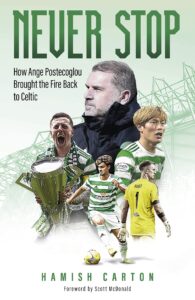 Never Stop is the story of how Australian manager Ange Postecoglou took Celtic from the edge of despair to the UEFA Champions League, via a domestic ‘double’ in his debut season.
Never Stop is the story of how Australian manager Ange Postecoglou took Celtic from the edge of despair to the UEFA Champions League, via a domestic ‘double’ in his debut season. Over 46 chapters, journalist Aidan Smith, once a fanatic programme collector, then a dangerous obsessive, who is now under control without a restraining order, takes us through the wonderment of Scottish football in an episodic wandering of the mind which enriches the spirit. As a book it can be dipped in and out of so that you find that which attracts you most – any headline mention of MY team – and that which intrigues you more – anecdotes from a time you remember…
Over 46 chapters, journalist Aidan Smith, once a fanatic programme collector, then a dangerous obsessive, who is now under control without a restraining order, takes us through the wonderment of Scottish football in an episodic wandering of the mind which enriches the spirit. As a book it can be dipped in and out of so that you find that which attracts you most – any headline mention of MY team – and that which intrigues you more – anecdotes from a time you remember…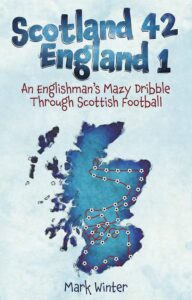 Scotland 42 England 1 is an English OAP’s light-hearted and affectionate look at Scottish football.
Scotland 42 England 1 is an English OAP’s light-hearted and affectionate look at Scottish football.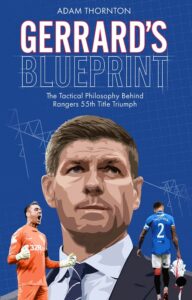 An in-depth analysis of Rangers’ tactical evolution over three seasons under Steven Gerrard, culminating in a league title win which saw them crowned kings of Scotland for a 55th time.
An in-depth analysis of Rangers’ tactical evolution over three seasons under Steven Gerrard, culminating in a league title win which saw them crowned kings of Scotland for a 55th time.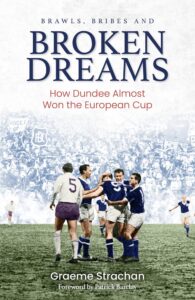 Scottish teams have a tough time in European competition. It is not just the games in which they may struggle which are challenging but also the humour plumbed when Christmas comes and the best present a fan could have, would be a European tie in January.
Scottish teams have a tough time in European competition. It is not just the games in which they may struggle which are challenging but also the humour plumbed when Christmas comes and the best present a fan could have, would be a European tie in January.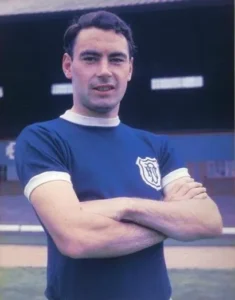
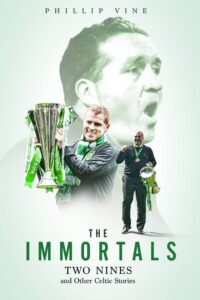 The Immortals is a passionate love letter to Celtic FC, by turns ecstatic and distressed, angry and joyous, but always obsessed.
The Immortals is a passionate love letter to Celtic FC, by turns ecstatic and distressed, angry and joyous, but always obsessed. The Official Rangers Story celebrates the rich history of Rangers FC, one of the oldest and most successful football clubs in the world.
The Official Rangers Story celebrates the rich history of Rangers FC, one of the oldest and most successful football clubs in the world.
